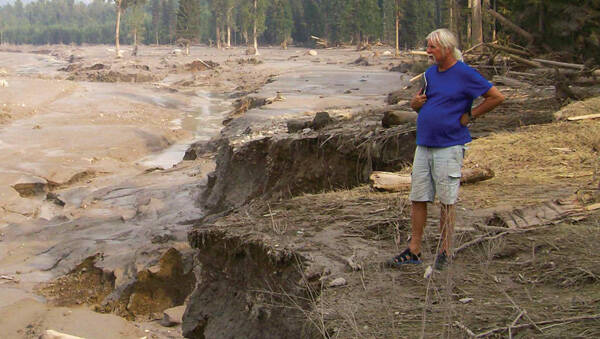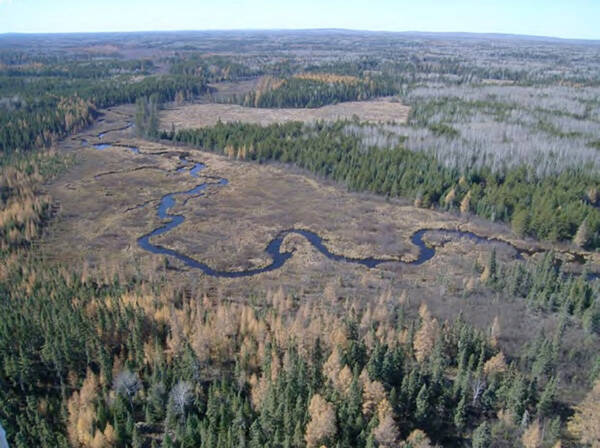HR 3115: The PolyMet Bill - Nolan's War of Choice on Minnesota's Waters

In early July, 8th District Congressman Rick Nolan (D- Minn.) introduced H.R. 3115, a bill to force the completion of a highly controversial land exchange between the U.S. Forest Service (USFS) and Canadian PolyMet Mining. Nolan's bill would fast-track the land exchange, requiring that it be completed within 90 days of the bill becoming law, even though no permits have yet been issued. The bill would give PolyMet 6,650 acres of protected Superior National Forest (SNF) and pave the way for construction of PolyMet's open-pit copper-nickel sulfide mine. PolyMet's sulfide mine would be the first ever to be permitted in the state. Minnesota’s Governor Mark Dayton has himself said that "this type of mining creates highly toxic sulfide waste."
The Federal lands at risk are a combination of forested wetlands, public waters, and critical wildlife habitat. At least 1,000 acres of irreplaceable wetlands would be destroyed and up to 8,000 acres impaired by the mining. The mine would also destroy nearly 4,000 acres of critical habitat for Canada lynx and gray wolf, creating toxic sulfide mine waste, enormous waste rock stockpiles, roads and other mining infrastructure. Most of the damage would be permanent. According to Marc Fink, senior attorney for the Center for Biological Diversity, “This bill is a blatant end run around current laws to hand Superior National Forest land over to a mining corporation. It should be stopped in its tracks.”
Undermining of Citizens Due Process Rights and Environmental Protections
Nolan's bill was introduced to override four separate legal actions by environmental groups and affected citizens who are challenging the land exchange in court. By moving to bypass the judicial process, Nolan is denying his own constituents, as well as the citizens of his state and nation, due process under the law. Impacted citizens and groups have the legal right to challenge Federal agency decisions under the National Environmental Policy Act (NEPA) as well as other laws.
NEPA, signed into law in 1970, is referred to as the "environmental Magna Carta." NEPA requires governmental agencies to assess the environmental and related effects of proposed actions through the preparation of environmental impact statements. Enforcement of the NEPA process is by a citizen suit provision, meaning any citizen can bring a lawsuit against the responsible Federal agency for violation of NEPA. HR 3115 would override the NEPA process as well as the Administrative Procedures Act (APA), the Weeks Act, the Endangered Species Act, and numerous laws which allow for public recourse as part of environmental review and protections.
Also of significant concern is that public land belongs to the citizens of the United States and was set aside for their benefit and enjoyment, as well as watershed protection, now and into the future. Yet public interests are forgotten in Nolan's legislative initiative, while foreign mining companies--Canadian PolyMet and Swiss multinational conglomerate Glencore--will reap the benefits, destroying our land for future use and poisoning our water. Kevin Lee, staff attorney at the Minnesota Center for Environmental Advocacy (MCEA) stated, "Rep. Nolan's bill is a giveaway of public land, plain and simple. It is a windfall for PolyMet and a swindle of public land users who use public land for hunting, fishing, and recreation."

The Value of Public Lands
The land sought by PolyMet for its proposed open pits was originally purchased by the USFS under the Weeks Act of 1911, for the purpose of protecting the rivers and streams of the headwaters of Lake Superior, an internationally important watershed. Open-pit copper mining is not allowed on the Superior National Forest under the Weeks Act. Rather than saying 'no' as dictated by law, and protecting the irreplaceable natural resources of the Forest, the USFS agreed to trade public land to Canadian PolyMet for its toxic open pit copper-nickel sulfide mine.
The wild and remote National Forest lands that would be exchanged with PolyMet are habitat for wildlife, including species considered threatened or endangered. These valuable lands include Aquatic Resources of National Importance (ARNI), an ecosystem that is designated as "imperiled-vulnerable" in Minnesota, and an area most of which is rated as of "high biodiversity significance" by the Minnesota Biological Survey. The Forest Service also ignored the value of forests and wetlands in moderating climate change, and the importance of clean water for future generations.
Protecting our water resources is an issue of national security. PolyMet's mine would pollute the headwaters of Lake Superior, and the entire Great Lakes system, with highly toxic sulfide mining waste. The lands and waters of Superior National Forest have an intrinsic value that is not being considered in a pro-mining atmosphere.
Environmental Injustice for Those Downstream
On July 7 on KBJR TV, regarding the Great Lakes Restoration Program, Rep. Nolan stated, "There is some of us that recall a time when they were dumping taconite tailings into Lake Superior. And business and industry were dumping pollution into the river and into the lakes and it had terrible consequences for both fish, aquatic life, and human life." It's inconceivable that Nolan can understand and acknowledge pollution consequences of the past while pushing to advance the permitting of the most toxic kind of mining in the present. At the same time that he seeks to appease the Duluth electorate by advocating for funds for clean-up at the mouth of the St. Louis River, Nolan is moving to advance a new wave of pollution on the river's headwaters.
Our politicians and corporate-controlled agencies are playing roulette with our water and our people--pitting promised mining jobs against those who live downstream, who value and need water as a precious natural resource in its own right, and who wish to protect future generations from tailings basin disasters, water pollution, and clean up costs. The largest human population in northeast Minnesota lives downstream of the proposed PolyMet mine and tailings basin. This includes the Fond du Lac Indian Reservation, as well as the cities of Cloquet and Duluth (and Superior, Wisconsin).
The major tailings basin disasters of Canadian Mount Polley in 2014 and Brazil's Samarco in 2015, whose toxic waste flowed over 400 miles downstream, clearly demonstrate that large-scale mine dam failures are not only possible, but likely. This is especially true when dealing with the large amounts of waste rock resulting when mining massive low-grade deposits-- in PolyMet's case, less than 1% mineralization, meaning 99% waste rock. PolyMet's own environmental impact statement concedes that water from PolyMet's mine site would need to be treated for at least 200 years after closure, and the plant site for 500 years - virtually forever. PolyMet could have been stopped on this issue alone. The fact that the project is in the permitting stage is clear evidence of political and regulatory capture by mining interests. Lori Andresen of the northern Minnesota based group Save Our Sky Blue Waters states, “In authoring this bill to fast-track PolyMet’s destructive mine on protected public lands, Rep. Nolan is endorsing an extremely dangerous practice. Placing corporate special interests ahead of the public interest by attempting to subvert current laws and legislate away due process and the constitutionally created right to have one’s day in court, undermines our democracy. Nolan’s political intervention for a foreign mining company demonstrates that the laws and environmental protections of our nation don’t apply equally to powerful multinational corporations and affected citizens."
Long Term Toxic Legacy, Dangerous Precedent
Political leaders have continually assured the public that we can rely on PolyMet's environmental review process and that PolyMet would only be permitted if it would not harm the water and environment. But as soon as legal challenges put forth by environmental groups and citizens appeared to have merit, Rep. Nolan authored a bill to prevent those suits from going forward. Nolan's version of environmental review eliminates the right of citizens to question or challenge a Federal regulatory decision. While Nolan may believe that his efforts are geared to promoting mining jobs while gaining himself some votes, in reality he is overturning citizen rights established as part of a democracy and granting legislative influence and power to foreign mining conglomerates.
H.R 3115 sets precedence for future legislative actions that would enable controversial and destructive corporate plans to go forward, bypassing citizen input, judicial review, and harm to the environment and to people's health. Congressional passage of special interest bills for powerful industries could be used to overturn hard-won laws and safeguards previously enacted to protect our land, water, wildlife, people and their communities. To ensure passage of his H.R. 3115, Nolan is aligning with anti-public-lands Republicans such as Congressmen Paul Gossar of Arizona and Bruce Westerman of Arkansas who accompanied him on an Iron Range tour. Nolan is hoping to garner bipartisan support to pass his bill in order to facilitate toxic sulfide mining in the headwaters of Lake Superior and the Great Lakes system.
In further hopes of retaining the mining vote, Rep. Nolan has been lobbying the Trump administration to reverse course on the Obama administration's denial of federal mineral leases for the Twin Metals sulfide mine near Ely and the Boundary Waters. The Twin Metals mine could be jump started through Federal legislation, similar to what Nolan is trying with the PolyMet bill.
Corporate vs. Citizen Power
Nolan, is willing to take away citizen rights while leaving behind a legacy of destruction of the land and pollution of the water for all future generations. Nolan won his last election by a mere 2,000 votes. While courting the Iron Range, Nolan remains dependent on Duluth's support, even as he goes about setting up Duluth as the receiving end of PolyMet's toxic mining pollution.
The next question is this: will Senators Klobuchar, Franken, or others support Nolan's actions? In February 2017, a Minnesota Environmental Partnership (MEP) statewide poll showed that 74% of those polled opposed the PolyMet mine. https://www.mepartnership.org/wp-content/uploads/2012/11/Public_Mining-Polling-results.pdf In a corporate controlled world, do citizens wield any power to protect the planet?
It's time to call a spade a spade. Call these legislators now to let them know you oppose H.R. 3115, asking them to withdraw any support of the bill.
Please Call: Senator Al Franken: 202-224-5641 Senator Amy Klobuchar: 202-224-3244 U.S. Representative Tim Walz: 202-225-247 For more info got to www.sosbluewaters.org
